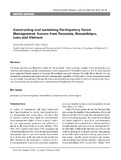| dc.contributor.author | Mustalahti, I | |
| dc.contributor.author | Nathan, Iben | |
| dc.date.accessioned | 2013-06-30T06:46:08Z | |
| dc.date.issued | 2007-09 | |
| dc.identifier.citation | Mustalahti, I., & Nathan, I. (2007, September). Constructing and sustaining participatory forest management: lessons from Tanzania, Mozambique, Laos and Vietnam. In IUFRO Congress: forests and forestry in the context of rural development, Poland | en |
| dc.identifier.uri | http://ffp.ibles.pl/content/archiwe-issues/2009/vol-51-1/mustalahti9-1-11.pdf | |
| dc.identifier.uri | http://hdl.handle.net/11295/42693 | |
| dc.description.abstract | The paper introduces an illustrative model, the ‘house model’, which contains a number of key elements for constructing
and sustaining people’s participation in forest management. The model is used as a tool for analysing four donor supported forestry projects in Tanzania, Mozambique, Laos and Vietnam. The study shows that the two core elements for sustaining participation in forest management, regardless of land tenure or forest management model, are: (a) attitude: local people in the specific context see themselves as responsible for the local resources and; (b) access:
local people gain secured access to information and benefits from the resources | en |
| dc.language.iso | en | en |
| dc.publisher | University of Nairobi. | en |
| dc.title | Constructing and sustaining participatory forest management: lessons from Tanzania, Mozambique, Laos and Vietnam | en |
| dc.type | Working Paper | en |
| local.embargo.terms | 6 months | en |
| local.embargo.lift | 2013-12-27T06:46:08Z | |
| local.publisher | Wangari Maathai Institute for Peace and Environmental Studies | en |

